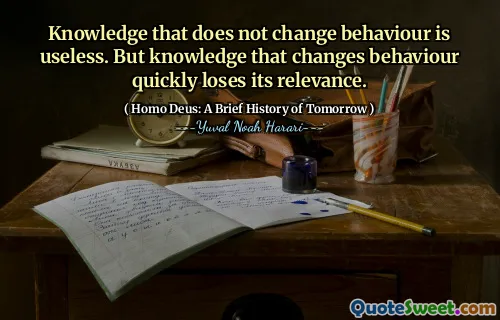Yuval Noah Harari is a renowned historian and author known for his thought-provoking insights on humanity's past, present, and future. His notable works, including "Sapiens: A Brief History of Humankind," "Homo Deus: A Brief History of Tomorrow," and "21 Lessons for the 21st Century," delve into the evolution of human societies, the impact of technology, and the challenges we face in the modern world. Through engaging narratives, Harari examines how humans have shaped their environments and the potential paths that lie ahead. His writing often blends history with philosophical questions, encouraging readers to reflect on the moral implications of advancements in science and technology. Harari argues that while human beings have achieved remarkable progress, we are also confronted with unprecedented dilemmas, such as the ethical concerns surrounding artificial intelligence and biotechnology. He emphasizes the importance of understanding our history to navigate the complexities of contemporary life. Furthermore, Harari advocates for critical thinking and awareness in an age filled with information overload. He urges individuals to seek clarity in their beliefs and decisions amidst a rapidly changing world. By fostering dialogue about our past and future, Harari aims to empower people to make informed choices that will shape a better society for generations to come.
Yuval Noah Harari is a prominent historian and author, best known for his impactful works that explore human history, societal evolution, and the future of mankind. His bestselling books, such as "Sapiens," "Homo Deus," and "21 Lessons for the 21st Century," have captivated readers worldwide. Through his engaging narrative style, he delves into the intricacies of how humans have developed and adapted over time.
In his writings, Harari merges history with deep philosophical inquiries, challenging readers to reflect on the implications of technological advancements and ethical dilemmas they present. He examines the balance between progress and moral responsibility, urging us to consider the potential consequences of our innovations in areas like artificial intelligence.
Moreover, Harari emphasizes the relevance of critical thinking and awareness in today's fast-paced information age. He believes that a thorough understanding of our past is essential for navigating present challenges and making informed choices for the future. By fostering discussion and awareness, Harari aims to inspire individuals towards building a thoughtful and intentional society.
More »
Today Birthdays
1955 -
Max Lucado
1946 -
John Piper
1842 -
William James
1907 -
Abraham Joshua Heschel
1887 -
Aldo Leopold
1755 -
Alexander Hamilton
1976 -
Alethea Kontis
1971 -
Mary J. Blige
1825 -
Bayard Taylor
1943 -
Jim Hightower
1885 -
Alice Paul
1923 -
Carroll Shelby
1928 -
David L. Wolper
1954 -
Kailash Satyarthi
1972 -
Amanda Peet
1946 -
Naomi Judd
1970 -
Malcolm D. Lee
1955 -
Christian Marclay
1973 -
Rahul Dravid
1987 -
Jamie Vardy
1942 -
Clarence Clemons
1992 -
Fatima Sana Shaikh
1948 -
Larry Harvey
1930 -
Rod Taylor
